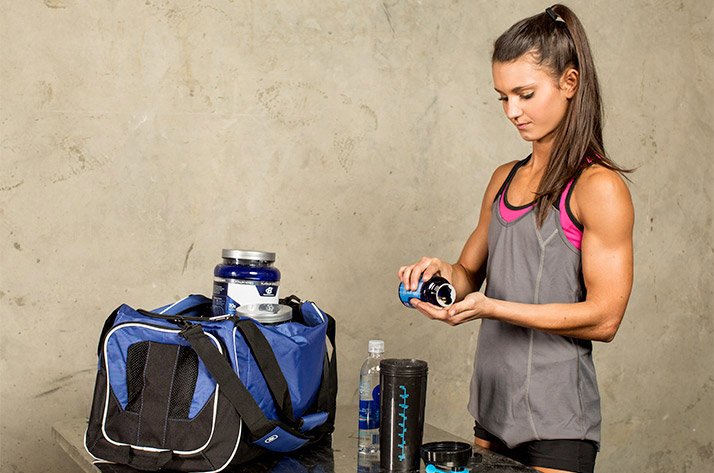
The 5 Best Supplements For Increased Athletic Performance!
Whether you're an amateur athlete or a weekend warrior, our list of the top 5 supplements for improved athletic performance can help you get the most out of every workout, game, or run!
Google "supplements" and you'll find hundreds of products designed to help get you as big as a bodybuilder or as strong as a powerlifter. But what if those goals don't match up with your own? What if you're interested in boosting your athletic performance, general fitness, and overall health, or you're simply a weekend warrior looking to get the most from your workouts?
After all, not everyone wants to spend his life in a gym. Your preference for athletics may be a few hours playing tennis or pick-up soccer games, an afternoon hike, a mud run, or even some home training. You may not be a professional athlete, but that doesn't mean you don't take physical fitness seriously. And that means you probably want to improve your performance, regardless of how it's measured.
If that sounds like you, you're in luck. You won't need Google to find the best supplements for your goals, because we've got the top five right here!
1Creatine Monohydrate
Recommended dose: 3-5 grams per day
You've likely heard creatine is one of the most effective performance supplements in terms of improving high-intensity work capacity, muscle mass, strength, and body composition.1,2 This is absolutely true, and that's why creatine tops the list!

Creatine supplementation works by increasing phosphocreatine (PCr) stores within the muscle, allowing for quicker regeneration of adenosine triphosphate (ATP), the body's source of energy.3 This is important for any physical activity that requires a rapid energy source during high-intensity explosive exercise, and it's why creatine is so important for performance.
Trust us, you don't want to fall short on energy when you're jumping over fire pits or climbing up 15-foot walls! Even if mud runs aren't your thing, creatine has been shown to improve performance on the playing field, as well. Research has demonstrated improvements in power output, muscular endurance, and sprint performance in sports like soccer, hockey, rugby, and football.4,5,6
2
Caffeine
Recommended Dose: 1.8-2.7 milligrams per pound of body weight
(200-400 milligrams for a 150-pound individual) 60 minutes prior to exercise
Looking to shave seconds off your 5K time or improve the accuracy of your passes on the soccer field? Yes, caffeine has been suggested to help you do those things! Caffeine is a well-documented ergogenic aid in performance research, and its use in sports dates all the way back to the 1920s.

Most of us consume caffeine because of its ability to increase alertness (how else are we going to make it through a work day?), but this jack-of-all-trades stimulant can also reduce the perception of effort, increase fat oxidation, and stimulate the release of endorphins during your workouts.
Whether you like to spend your weekends on the rugby field or trying to set PRs in the gym, current research supports the benefits of caffeine in sports and high-intensity intermittent exercise.7,8,9,10
3Beta-Alanine
Recommended Dose: 3-6 grams per day
It's mile five of the Tough Mudder and you still have ditches to hurdle, ladders to climb, and walls to scale. When pride and bragging rights between you and your buddies are at stake, you need all the help you can get! Enter beta-alanine.
During high-intensity activity, your body accumulates hydrogen ions, causing a drop in your pH level, ultimately resulting in fatigue. Beta-alanine supplementation has been shown to increase intramuscular carnosine content, thereby increasing the body's ability to buffer hydrogen ions and delay fatigue.11
Beta-alanine supplementation can help improve your exercise performance and training volume, which will ultimately help solidify your right to gloat for another year.
4Protein
Recommended Dose: 20-25 grams whey protein
Physical activity puts stress on your body, and that stress increases the longer, harder, or more frequently you engage in fitness. Recovery, then, becomes more critical as your training increases, and protein is essential for recovery.

Keep in mind that protein is rarely used as an energy substrate (i.e., fuel) during shorter-duration activities like a lifting session at the gym, 3-on-3 basketball games, or shorter races. However it's still essential for the repair, construction, and maintenance of muscle mass.
Consuming protein after a tough workout will not only increase protein synthesis rates, but will help you recover faster so that you're ready to dominate your next event!
5
Fish Oil
Recommended Dose: 2 grams (EPA+DHA)
Fish oil is an excellent source of omega-3 fatty acids, which are key players in the recovery process. EPA and DHA—two essential fatty acids found in fish oils—may support a healthy inflammation response after exercise. This may help to reduce the post-exercise muscle soreness often felt for hours or days after strenuous or unaccustomed exercise.12

Omega-3s are also critical for building and maintaining muscles, and they may help you recover faster and train harder!13
References
- Buford, T. W., Kreider, R. B., Stout, J. R., Greenwood, M., Campbell, B., Spano, M., ... & Antonio, J. (2007). Journal of the International Society of Sports Nutrition. Journal of the International Society of Sports Nutrition, 4(6), 6.
- Van Loon, L. (2003). Effects of creatine loading and prolonged creatine supplementation on body composition, fuel selection, sprint and endurance performance in humans. Clinical Science, 104, 153-162.
- Cooper, R., Naclerio, F., Allgrove, J., & Jimenez, A. (2012). Creatine supplementation with specific view to exercise/sports performance: an update. Journal of the International Society of Sports Nutrition, 9(1), 33.
- Cox, G., Mujika, I., Tumilty, D., & Burke, L. (2002). Acute creatine supplementation and performance during a field test simulating match play in elite female soccer players. International Journal of Sport Nutrition and Exercise Metabolism, 12(1), 33-46.
- Jones, A. M., Atter, T., & Georg, K. P. (1999). Oral creatine supplementation improves multiple sprint performance in elite ice-hockey players. The Journal of Sports Medicine and Physical Fitness, 39(3), 189-196.
- Chilibeck, P. D., Magnus, C., & Anderson, M. (2007). Effect of in-season creatine supplementation on body composition and performance in rugby union football players. Applied Physiology, Nutrition, and Metabolism, 32(6), 1052-1057.
- Glaister, M., Howatson, G., Abraham, C. S., Lockey, R. A., Goodwin, J. E., Foley, P., & McInnes, G. (2008). Caffeine supplementation and multiple sprint running performance. Medicine and Science in Sports and Exercise, 40(10), 1835-1840.
- Greer, F., McLean, C., & Graham, T. E. (1998). Caffeine, performance, and metabolism during repeated Wingate exercise tests. Journal of Applied Physiology, 85(4), 1502-1508.
- Stuart, G. R., Hopkins, W. G., Cook, C., & Cairns, S. P. (2005). Multiple effects of caffeine on simulated high-intensity team-sport performance. Medicine and Science in Sports and Exercise, 37(11), 1998-2005
- Foskett, A., Ali, A., & Gant, N. (2009). Caffeine enhances cognitive function and skill performance during simulated soccer activity. International Journal of Sport Nutrition and Exercise Metabolism, 19(4), 410-423.
- Hoffman, J. R., Ratamess, N. A., Faigenbaum, A. D., Ross, R., Kang, J., Stout, J. R., & Wise, J. A. (2008a). Short-duration beta-alanine supplementation increases training volume and reduces subjective feelings of fatigue in college football players. Nutrition Research, 28(1), 31-35.
- Tartibian, B., Maleki, B. H., & Abbasi, A. (2009). The effects of ingestion of omega-3 fatty acids on perceived pain and external symptoms of delayed onset muscle soreness in untrained men. Clinical Journal of Sport Medicine, 19(2), 115-119.
- Smith, G. I., Atherton, P., Reeds, D. N., Mohammed, B. S., Rankin, D., Rennie, M. J., & Mittendorfer, B. (2011). Omega-3 polyunsaturated fatty acids augment the muscle protein anabolic response to hyperinsulinaemia-hyperaminoacidaemia in healthy young and middle-aged men and women. Clinical Science, 121(6), 267-278.
